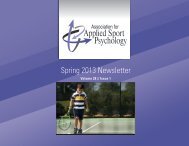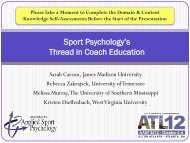Performance Excellence Movement - Association for Applied Sport ...
Performance Excellence Movement - Association for Applied Sport ...
Performance Excellence Movement - Association for Applied Sport ...
Create successful ePaper yourself
Turn your PDF publications into a flip-book with our unique Google optimized e-Paper software.
<strong>Per<strong>for</strong>mance</strong> <strong>Excellence</strong> <strong>Movement</strong><br />
December 2009; Vol. 6(1)<br />
Altering my role was easier than expected. Because many of the employees were <strong>for</strong>mer athletes, this<br />
allowed me to use the same sport analogies when introducing skills. While many of the techniques I<br />
utilized with the employees were the same as those I’ve used with athletes, their response and<br />
expectations varied. I found that the athletes tended to look <strong>for</strong> specific techniques to improve their<br />
per<strong>for</strong>mance, whereas the employees were looking <strong>for</strong> a brief support system and not necessarily any<br />
tangible skills. This difference in expectations highlights the importance of being able to understand your<br />
clientele, both <strong>for</strong> their per<strong>for</strong>mance needs and psychosocial needs. The individual needs of the person<br />
should always be met, yet in per<strong>for</strong>mance situations those needs are usually focused on improving one's<br />
abilities. Thus far, the personal needs of the employees have played an equally large role in improving<br />
their work per<strong>for</strong>mance.<br />
The role of supporting employees is also self-serving <strong>for</strong> me in a few different ways. For example, my<br />
new role challenged me to be more creative in preparing sessions, and to be aware of how I addressed the<br />
different populations (i.e., language used, examples, etc.), and clarified the focus of each session. Unlike<br />
per<strong>for</strong>mance based counseling, the needs of the employees were often focused on personal issues rather<br />
than work. This new role was a reminder that sport psychology is not just about athletic per<strong>for</strong>mance, but<br />
also life skills. <strong>Per<strong>for</strong>mance</strong> enhancement is important in all areas.<br />
There are some clear lessons learned from this experience. First, I learned that there are parallel<br />
pressures in the business and athletic world. Both employees and athletes expect to per<strong>for</strong>m at their best,<br />
reach particular goals, and consistently meet their potential. Second, I have gained an understanding of<br />
how to effectively implement a program in the business setting. Third, this experience has taught me how<br />
to tackle the ethical and political dilemmas that are inevitable in our field. Lastly, working with a<br />
population like the employees has rein<strong>for</strong>ced my role as a sport psychology consultant. I now know that I<br />
can be someone who can provide guidance <strong>for</strong> the path towards achievement, but it is up to the individual<br />
how to use that in<strong>for</strong>mation. My role is to be supportive and help individuals reach their personal and<br />
work-related goals.<br />
<strong>Sport</strong> Psychology: A Mode to Promote Peace between Girls in Israel<br />
By Tanya Prewitt, M.S.<br />
In the spring of 2006, as a first year master’s student, I was passionate about sport psychology and<br />
the opportunities available in our growing field. As a result, when presented with the chance to travel to<br />
Israel to assist in facilitating teambuilding activities, I was ecstatic. I would be working with a camp<br />
designed to bring together Palestinian and Israel girls from the ages of 12 to 16 through sport. It was an<br />
opportunity I could not pass up. Throughout this article, I hope to share with you what I learned and<br />
how, due to my experience, I will never view sport psychology the same.<br />
j Rina’s Story 1<br />
Rina is from the West Bank and has been shot at be<strong>for</strong>e but never been wounded. She is a 21-yearold<br />
counselor who is going to school in Holland next fall. She has no idea what she will ever do in such<br />
a peaceful place because whenever she is in a calm, quiet place she feels uneasy. Fighting and chaos is<br />
all she has ever known so it is where she is most com<strong>for</strong>table even though it hurts. She is adamant that<br />
the people of Israel are doomed and will never know peace; yet, she wants to show them just a glimpse<br />
of it <strong>for</strong> a week. She explains that her reality will never be mine. I cry with her because of her pain and<br />
tell her I did nothing to deserve freedom. She doesn’t blame me.<br />
9






